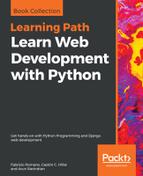When manipulating sequences, it's very common to have to access them at one precise position (indexing), or to get a subsequence out of them (slicing). When dealing with immutable sequences, both operations are read-only.
While indexing comes in one form, a zero-based access to any position within the sequence, slicing comes in different forms. When you get a slice of a sequence, you can specify the start and stop positions, and the step. They are separated with a colon (:) like this: my_sequence[start:stop:step]. All the arguments are optional, start is inclusive, and stop is exclusive. It's much easier to show an example, rather than explain them further in words:
>>> s = "The trouble is you think you have time."
>>> s[0] # indexing at position 0, which is the first char
'T'
>>> s[5] # indexing at position 5, which is the sixth char
'r'
>>> s[:4] # slicing, we specify only the stop position
'The '
>>> s[4:] # slicing, we specify only the start position
'trouble is you think you have time.'
>>> s[2:14] # slicing, both start and stop positions
'e trouble is'
>>> s[2:14:3] # slicing, start, stop and step (every 3 chars)
'erb '
>>> s[:] # quick way of making a copy
'The trouble is you think you have time.'
Of all the lines, the last one is probably the most interesting. If you don't specify a parameter, Python will fill in the default for you. In this case, start will be the start of the string, stop will be the end of the string, and step will be the default 1. This is an easy and quick way of obtaining a copy of the string s (same value, but different object). Can you find a way to get the reversed copy of a string using slicing (don't look it up; find it for yourself)?
